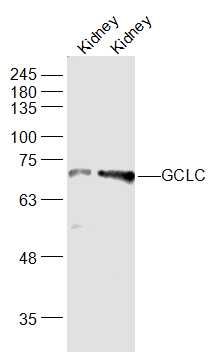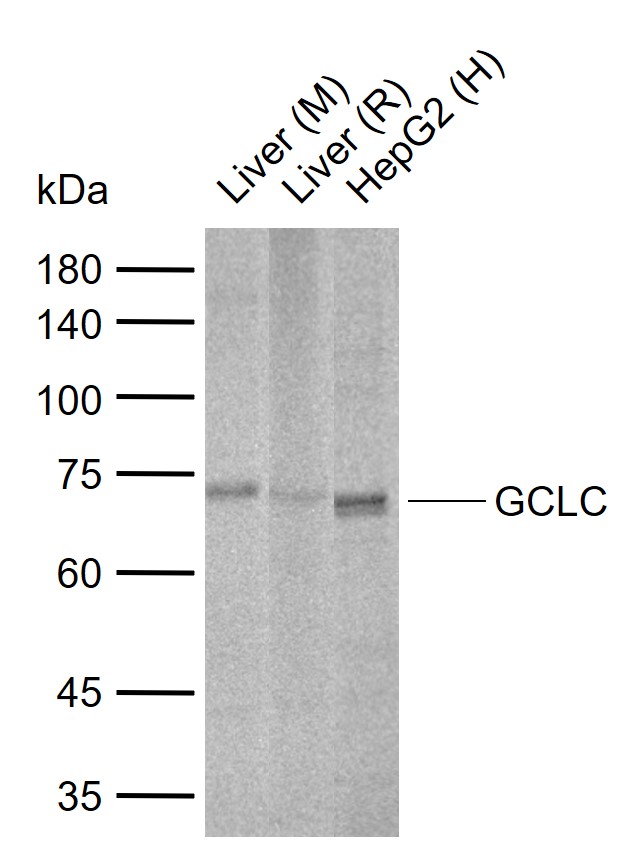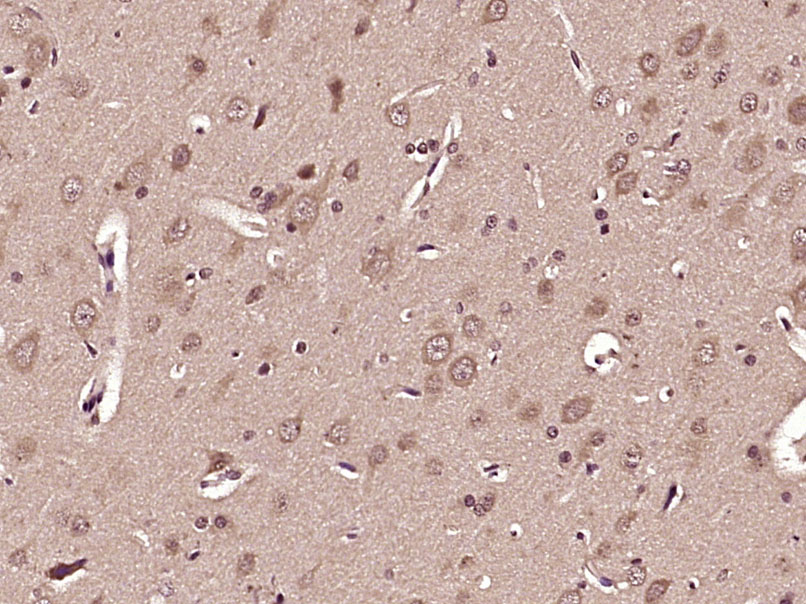
Rabbit Anti-GCLC antibody
Gamma ECS; Gamma GCS; Gamma glutamylcysteine synthetase; Gamma-ECS; Gamma-glutamylcysteine synthetase; GCL; GCLC; GCS; GCS Heavy Chain antibody GLCL; GLCLC; GLCLR; Glutamate cysteine ligase catalytic subunit; Glutamate cysteine ligase (gamma glutamylcyste
View History [Clear]
Details
Product Name GCLC Chinese Name γ谷氨酰半胱氨酸合成酶抗体 Alias Gamma ECS; Gamma GCS; Gamma glutamylcysteine synthetase; Gamma-ECS; Gamma-glutamylcysteine synthetase; GCL; GCLC; GCS; GCS Heavy Chain antibody GLCL; GLCLC; GLCLR; Glutamate cysteine ligase catalytic subunit; Glutamate cysteine ligase (gamma glutamylcysteine synthetase) regulatory (30.8kD); Glutamate cysteine ligase catalytic subunit; Glutamate cysteine ligase modifier subunit; Glutamate cysteine ligase regulatory protein; Glutamate cysteine ligase regulatory subunit; Glutamate--cysteine ligase catalytic subunit; GSH1_HUMAN. literatures Research Area Tumour Cell biology immunology Neurobiology Signal transduction Immunogen Species Rabbit Clonality Polyclonal React Species Human, Mouse, Rat, (predicted: Chicken, Dog, Pig, Cow, Horse, Rabbit, Zebrafish, ) Applications WB=1:500-2000 IHC-P=1:100-500 IHC-F=1:100-500 ICC=1:100-500 IF=1:100-500 (Paraffin sections need antigen repair)
not yet tested in other applications.
optimal dilutions/concentrations should be determined by the end user.Theoretical molecular weight 73kDa Cellular localization cytoplasmic Form Liquid Concentration 1mg/ml immunogen KLH conjugated synthetic peptide derived from human GCLC: 351-450/637 Lsotype IgG Purification affinity purified by Protein A Buffer Solution 0.01M TBS(pH7.4) with 1% BSA, 0.03% Proclin300 and 50% Glycerol. Storage Shipped at 4℃. Store at -20 °C for one year. Avoid repeated freeze/thaw cycles. Attention This product as supplied is intended for research use only, not for use in human, therapeutic or diagnostic applications. PubMed PubMed Product Detail The GCLC gene consists of 16 exons and encodes the 636 amino acid protein g-GCSc (g-glutamylcysteine synthetase heavy subunit), also designated g-L-glutamate-L-cysteine ligase catalytic subunit (GLCLC). g-GCSc is expressed in hemocytes, brain, liver and kidney. g-GCSc associates with a regulatory or modifier subunit, g-GCSm (g-glutamylcysteine synthetase light subunit), to form a heterodimer, g-GCS. g-GCS is the first enzyme involved and the rate determining step in glutathione biosynthesis. Oxidants, cadium and methyl mercury upregulate the transcription of g-GCS. H2O2 regulation depends on the Yap1 protein and the presence of glutamate, glutamine and lysine. Cadium regulates transcription through proteins Met-4, Met-31 and Met-32. Cbf1, a DNA binding protein, inhibits transcription of g-GCS. Chemopreventive compounds cause increased levels of g-GCSc in kidney tissues, which may protect against chemically induced carcinogenesis. A His370Leu amino acid change in g-GCSc causes deficiencies in activity which are responsible for hemolytic anemia and low red blood cell glutathione levels. Defects in GCLC are the cause of hemolytic anemia.
Subunit:
Heterodimer of a catalytic heavy chain and a regulatory light chain.
DISEASE:
Defects in GCLC are the cause of hemolytic anemia (HAGGSD) [MIM:230450].
Similarity:
Belongs to the glutamate--cysteine ligase type 3 family.
SWISS:
P48506
Gene ID:
2729
Database links:Entrez Gene: 2729 Human
Entrez Gene: 14629 Mouse
Omim: 606857 Human
SwissProt: P48506 Human
SwissProt: P97494 Mouse
Unigene: 654465 Human
Unigene: 89888 Mouse
Unigene: 8365 Rat
Product Picture
Kidney (Mouse) Lysate at 40 ug
Kidney (Rat) Lysate at 40 ug
Primary: Anti-GCLC (SL23393R) at 1/1000 dilution
Secondary: IRDye800CW Goat Anti-Rabbit IgG at 1/20000 dilution
Predicted band size: 73 kD
Observed band size: 73 kD
Sample:
Lane 1: Mouse Liver tissue lysates
Lane 2: Rat Liver tissue lysates
Lane 3: Human HepG2 cell lysates
Primary: Anti-GCLC (SL23393R) at 1/1000 dilution
Secondary: IRDye800CW Goat Anti-Rabbit IgG at 1/20000 dilution
Predicted band size: 73 kDa
Observed band size: 73 kDa
Paraformaldehyde-fixed, paraffin embedded (Rat brain); Antigen retrieval by boiling in sodium citrate buffer (pH6.0) for 15min; Block endogenous peroxidase by 3% hydrogen peroxide for 20 minutes; Blocking buffer (normal goat serum) at 37°C for 30min; Antibody incubation with (GCLC) Polyclonal Antibody, Unconjugated (SL23393R) at 1:400 overnight at 4°C, followed by operating according to SP Kit(Rabbit) (sp-0023) instructionsand DAB staining.
Partial purchase records(bought amounts latest0)
No one bought this product
User Comment(Total0User Comment Num)
- No comment





 +86 571 56623320
+86 571 56623320




